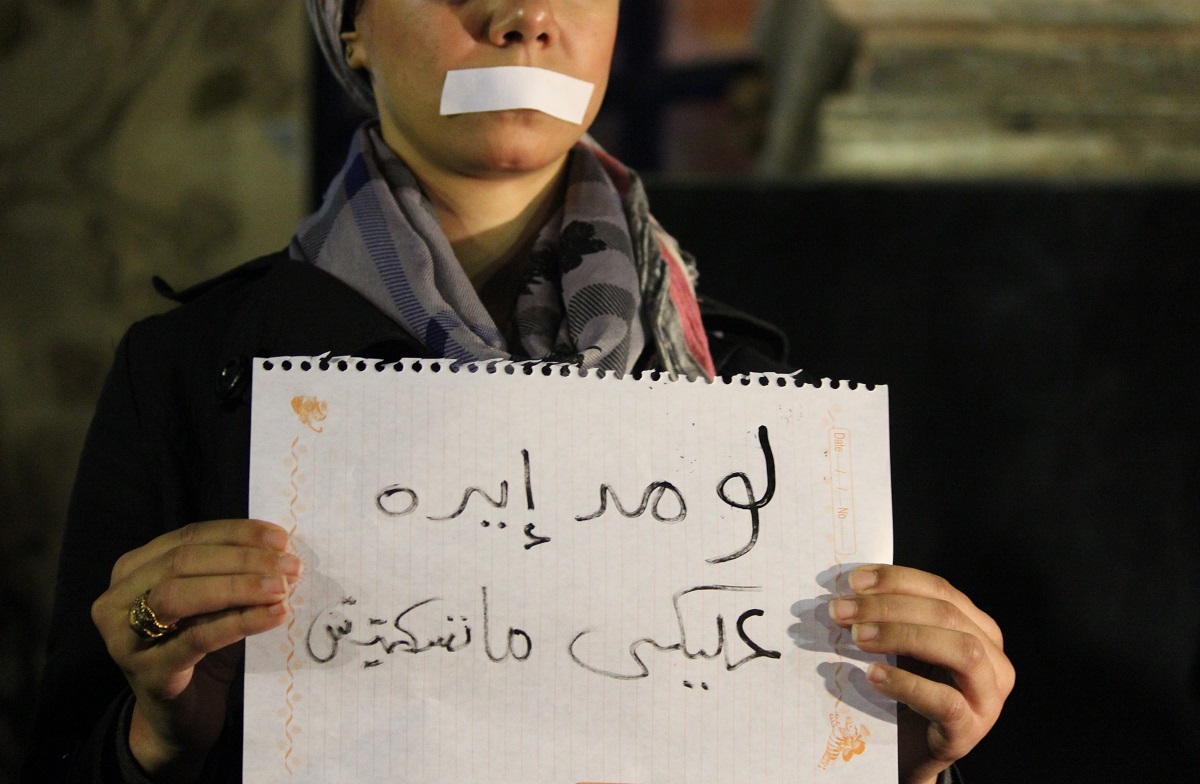Latest NEWS
- Aswat Masriya, the last word
- Roundup of Egypt's press headlines on March 15, 2017
- Roundup of Egypt's press headlines on March 14, 2017
- Former Egyptian President Hosni Mubarak to be released: lawyer
- Roundup of Egypt's press headlines on March 13, 2017
- Egypt's capital set to grow by half a million in 2017
- Egypt's wheat reserves to double with start of harvest -supply min
- Roundup of Egypt's press headlines on March 12, 2017
Egyptian women face violence, media abuse and exclusion from senior positions in 2015

During a stand in objection to the recent tourist marriages decision/ 22 Dec. 2015. Ahmed Hamed-Aswat Masriya
In this two-part series, Aswat Masriya reviews some of 2015's key incidents related to women in Egypt.
Written by Rahma Diaa
CAIRO, Dec 28 (Aswat Masriya) - Egyptian women suffered losses on several fronts in 2015, which was particularly evident in the continuation of violence and sexual harassment, as well as the inequality faced with regards to assuming senior administrative positions and getting appointed to the state’s legal institutions.
Violence
Women continued to face psychological abuse and physical assault in the streets and in households throughout 2015.
The number of complaints received by the National Council for Women (NCW) from the beginning of 2015 up until 25 November reached 91 complaints. Complaints included incidents of domestic violence, beating, torture, rape, and kidnapping.
However, there are cases that have not been registered by the NCW as some women chose to remain silent and not report acts of violence perpetrated against them.
Sexual harassment
Enforcing a harsher penalty on harassers has not been an effective detterent from committing violations.
The "I Saw Harassment" initiative documented 397 cases of verbal harassment and 50 cases of physical harassment during the Eid al-Adha festivities this year. Victims of harassment have avoided resorting to legal measures against the harassers.
The initiative’s coordinator Fathy Farid told Aswat Masriya that none of the cases decided to report the violation. They refused to take any legal measures and chose only to resort to psychological support as most fear entering police stations.
Similarly in Eid Al-Fitr, “I Saw Harassment” reported 223 cases throughout the three days of the feast.
Another case that acquired vast media attention was that of the “mall girl” whose video showing her being assaulted by a harasser went viral. The harasser was sentenced to one month in prison and a fine of EGP 200 by a Heliopolis Court.
Interim president Adly Mansour issued a presidential decree in June 2014, amending some articles in the Penal Code in order to expand the definition of “sexual harassment” and adopt harsher penalties on harassers.
Women representation in the government
The current Egyptian government includes only three women as ministers, which constitutes a setback given that the previous government included five women.
Ghada Wali remained the Minister of Social Solidarity, while two new ministers joined. Sahar Nasr joined as the Minister of International Cooperation and Nabila Abdel Shaheed became the Minister of Immigration, which is a newly established ministry.
Meanwhile, the position of governor remains reserved for men as evident from the governors’ shuffle after the adoption of the constitution.
Abusing women through the media
During 2015, several advertisements and media content were criticised by the public for abusing women and tarnishing their image.
In June, “I Saw Harassment” criticised actor Amr Youssef’s tourist resort advertisement for containing scenes implying verbal and physical harassment.
Furthermore, in August, the initiative criticised a caricature that likened women to livestock in a manner that was derogatory and offensive to women, according to the initiative’s statement.
Excluding women from the State Council
Women are still denied appointment in positions in the State Council.
Amina Gadallah, who was among those who applied for a position in the State Council, told Aswat Masriya that article 11 in the constitution remains suspended given the continued intransigence towards women.
Article 11 of the 2014 Egyptian constitution states, "The state shall take the necessary measures to ensure the representation of women in the Houses of Representatives, as specified by law. The state shall also guarantee women’s rights of holding public and senior management offices in the state and their appointment in judicial bodies and authorities without discrimination."
Gadallah filed a lawsuit against the decision to not appoint women to the State Council. However, the lawsuit was rejected.
In September, only the male graduates from the same class as Gadallah were granted positions by the State Council.
This article was translated into English by Nourhan Fahmy.










